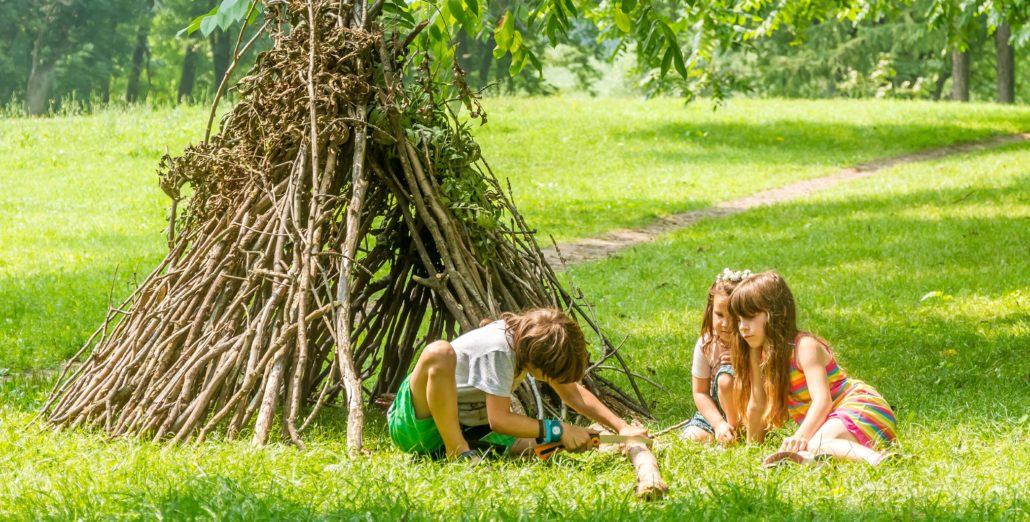Every parent in the western world is grappling with a strange problem- the need to entertain their children. Not only do they take care of the kids, they must also entertain them. Why? Because kids no longer go out and play on their own or with other kids. It is not safe to play out in neighborhoods. Or it is so unusual and because nobody else does it someone might call the cops. Or we have many efficient gadgets to distract kids that they have forgotten how to entertain themselves.

Although it seems drastic, as long it is safe, putting the kids under the trees will be beneficial in many ways. Some benefits are immediate. Others will take a while to develop. Many are long term benefits. In my childhood, as with many other adults, a tree was a great place to play. It created an incredible place with some unique features. A group of kids always gathered around the trees. We climbed the trees to view the town, calling out familiar landmarks from our perch. We made swords for our ‘fights’ with the leaves and grass stems. We sailed imaginary season branches and came tumbling down when the branch broke below us. We crowned our victor with a leafy crown. We played trade and used fruits or seeds as currency. We chased squirrels and birds to compete for the cherries and mangoes. We picked up numerous fantastic life skills from these games.
Today, we have more information about the benefits of playing in nature. Many researchers today show that the need to get the kids under the trees is urgent. In fact, not getting them to play outdoors is putting human race at risk. That is not an alarmist statement. It is backed by numerous research studies, both from the field of health and from the point of view of ecologists.
In recent decades, our lifestyle has become more and more sedentary. We move less and use cars or other modes of travel more frequently than we walk. Due to this, our children may be the first generation at risk of having shorter lifespan compared to their parents. Health screening of children shows an increase in childhood obesity, asthma, attention-deficit disorder, and vitamin D deficiency. These conditions may lead to poor pulmonary, cardiovascular and increased mental health problems in adulthood.
A kid’s life these days can be tough. They have demanding schoolwork and extracurricular schedule. Many kids from low-income background are cut-off from nature due to poor housing conditions, high-volume traffic, and a lack of parks and green spaces. Whatever the results may be, losing the opportunity to spend more time in nature results in low levels of physical activity, stress reduction, and healthy development.
Here is some more information to support the idea of putting the kids under the trees. Information gathered by doctor’s show—
- ~ 17% of children ages 2-19 years are obese and an additional 14.8% are considered overweight.
- ~3,700 children are newly diagnosed with type 2 diabetes each year.
- ~9.4% of children have asthma. Overweight kids have an increased risk of developing asthma.
- Most overweight children have at least one risk factor for cardiovascular disease, including higher cholesterol levels, abnormal glucose tolerance, high blood pressure, and elevated triglycerides.
Concerned about the deteriorating health and the increase in childhood stress, the pediatricians are now writing prescriptions for kids to play outdoors. Research studies show that playing outdoors relieves stress in children. Contact with nature and living near a natural environment improved the child’s self-worth and decreased the levels of psychological distress. Another study showed that children with ADD [Attention Deficit Disorder] had less severe symptoms in a greener setting. A 20-minute walk immersed in nature can increase concentration in children diagnosed with ADHD [Attention Deficit Hyperactivity Disorder]. Excessive indoor, close activity affects the eyes too. Research shows that children with high near-distance activity and low outdoor activity had two- to three-fold higher odds of having myopia than normal.
Free play or unstructured time to play is important for kids. It aids in physical, emotional, cognitive and social development. The benefits of play include healthy brain development, a more developed imagination, dexterity, emotional strength, and physical strength.
Parents and caregivers can ensure that children are physically active outdoors and engage in unstructured time to play for at least 60 minutes every day. Frequent ‘green’ breaks provide a mental rest and optimizes a child’s social, emotional, cognitive, and physical development. Children are more attentive and have better cognitive performance after a recess break.
Going for walks or runs with kids helps to build better communication with them. It helps you improve your health in the process. Now, that is a two major benefits for one act!